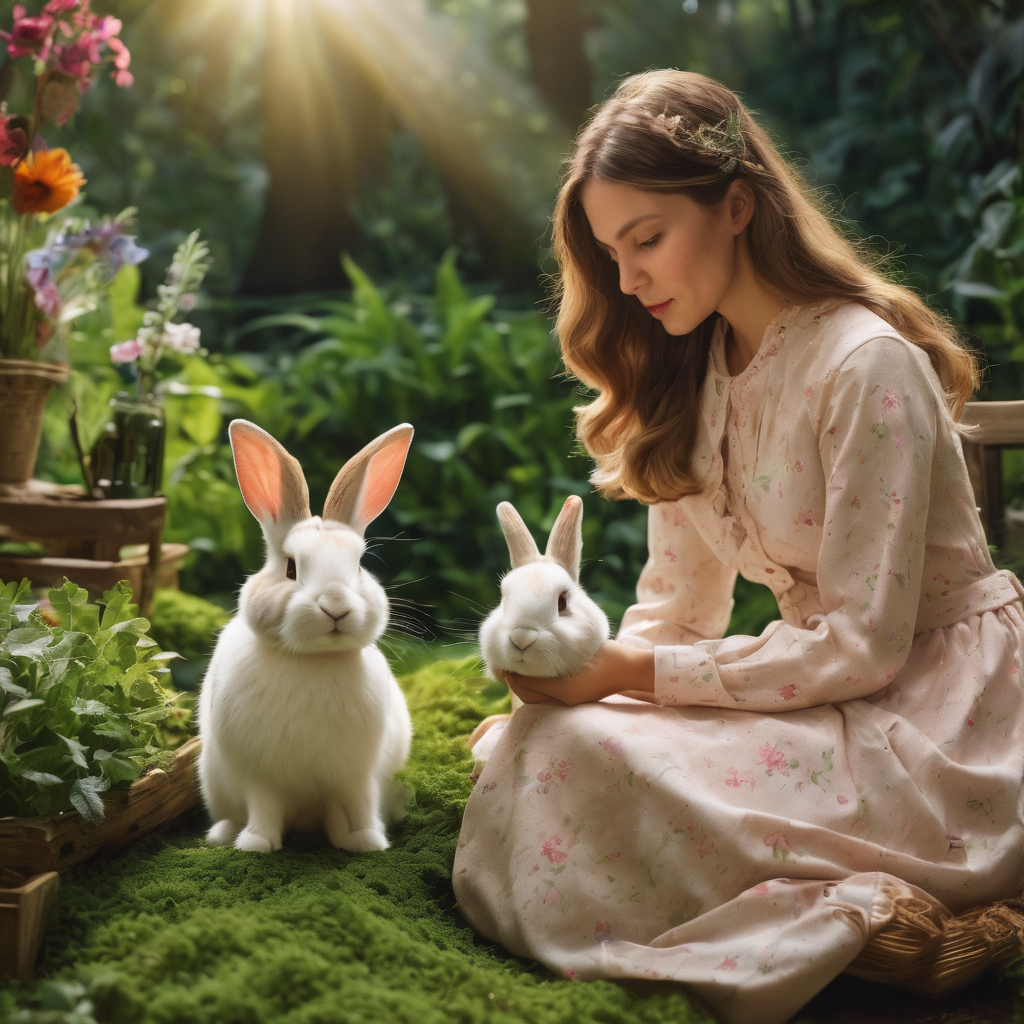Bunny Care: A Comprehensive Guide to Ensure Your Bunny’s Well-being
Discover comprehensive Bunny Care: Everything You Need to Know in this expert-written guide. From feeding to grooming, we’ve got it all covered.
Table of Contents
- Introduction
- Why Choose Bunny as Your Pet’s Priority?
- Types of Bunnies
- Bunny Breeds and Their Unique Characteristics
- Preparing for Your Bunny
- Essential Steps for Optimal Bunny Care
- Housing Your Bunny
- Different Options for Providing the Best Bunny Care
- Diet and Nutrition
- Key Aspects of Proper Bunny Care Diet
- Grooming Your Bunny
- The Importance of Grooming in Bunny Care
- Health and Wellness
- Ensuring the Well-being of Your Bunny
- Socialization and Play
- Bunny Care and the Role of Social Interaction
- Training Your Bunny
- Training Techniques for Effective Bunny Care
- Reproduction and Breeding
- Responsible Bunny Care: Understanding Bunny Breeding
- Handling Emergencies
- First Aid and Emergency Bunny Care
- Responsible Ownership
- The Commitment of Responsible Bunny Care
- Fun Facts about Bunnies
- Discovering the Fascinating World of Bunny Care
- Conclusion
- FAQs
Introduction
Welcome to the world of bunny care, where every bunny lover’s heart finds joy and fulfillment. In this comprehensive guide, we will delve into all aspects of Bunny Care to ensure the well-being of your furry friend. Let’s explore why Bunny Care is a top priority and how to provide them with the best possible care.
Why Choose Bunny as Your Pet’s Priority?
Prioritizing Bunny Care can be immensely rewarding. Bunnies, known for their gentle and intelligent nature, are ideal companions. Unlike some high-maintenance pets, bunnies are relatively low-maintenance, making them perfect for individuals or families with busy schedules. Let’s explore how to make Bunny Care a priority and enhance your bunny’s quality of life.

Types of Bunnies
Understanding the different bunny breeds and their unique characteristics is the first step in choosing the perfect bunny for your home.
Bunny Breeds and Their Unique Characteristics
- Holland Lop: These small, floppy-eared bunnies are famous for their sweet and gentle nature. They are known for their distinctive appearance and make wonderful indoor pets.
- Netherland Dwarf: Tiny and full of energy, Netherland Dwarfs are one of the smallest bunny breeds. They are adored for their small size and friendly personalities.
- Flemish Giant: On the opposite end of the size spectrum, Flemish Giants are docile and friendly. They make great companions for those with ample space.
Preparing for Your Bunny
Before bringing your bunny home, it’s crucial to prepare your living space and mindset. Bunny-proofing your home is essential to create a safe environment for your new furry friend.
Essential Steps for Optimal Bunny Care
- Remove electrical cords or cover them with protective tubing to prevent chewing.
- Ensure houseplants are out of reach, as some can be toxic to bunnies.
- Secure valuable or sentimental items that might be within your bunny’s reach.

Housing Your Bunny
Providing the right housing is vital for your bunny’s safety and comfort. Different housing options include cages, hutches, and enclosures.
Different Options for Providing the Best for you Bunny
- Cages: Wire cages with a solid floor are easy to clean and provide protection.
- Hutches: Wooden hutches offer a more spacious living area and can be placed indoors or outdoors.
- Enclosures: Indoor pens provide space for your bunny to roam while keeping them safe from household hazards.
Diet and Nutrition
A well-balanced diet is essential for your bunny’s health and longevity. Their diet primarily consists of hay, pellets, and fresh greens.
Key Aspects of Proper Bunny Care Diet
- Hay: Timothy hay should be available at all times to aid digestion and maintain dental health.
- Pellets: Choose high-quality bunny pellets that are high in fiber and low in fat. These should be provided in limited quantities.
- Fresh Greens: Offer a variety of leafy greens, such as kale, parsley, and romaine lettuce, for added nutrition and variety in your bunny’s diet.

Grooming Your Bunny
Regular grooming is necessary to keep your bunny’s fur in good condition and prevent hairballs. Brushing and nail trimming are essential grooming tasks.
The Importance of Grooming in Bunny Care
- Brushing: The frequency of brushing depends on the bunny’s coat length. Long-haired bunnies may require daily brushing, while short-haired breeds can be groomed less frequently.
- Nail Trimming: Trim your bunny’s nails every 4-6 weeks to prevent overgrowth and potential injury.
Health and Wellness
Understanding common health issues in bunnies is crucial for their well-being. Being proactive and observant can help you detect and address health problems early.
Ensuring the Well-being of Your Bunny
- Dental Issues: Bunnies’ teeth continue to grow throughout their lives. Dental problems can be prevented by providing a proper diet and plenty of items to chew on.
- Gastrointestinal Stasis: This condition, often caused by diet or stress, can be prevented with a high-fiber diet and a stress-free environment.
- Respiratory Infections: Maintain a clean living environment and avoid exposing your bunny to extreme temperature changes to prevent respiratory issues.
- External Parasites: Regular grooming and checkups can help prevent external parasite infestations.
Socialization and Play
Interacting with your bunny is not only enjoyable but also essential for their mental and emotional well-being.
Bunny Care and the Role of Social Interaction
- Spend quality time with your bunny each day, offering plenty of petting and companionship.
- Provide toys and puzzles to keep them mentally stimulated and engaged.
- Create a safe play area where they can hop, explore, and exercise.
Training Your Bunny
Bunnies are intelligent creatures that can be trained. Litter training and basic obedience are essential skills to teach your bunny.
Training Techniques for Effective Bunny Care
- Use a litter box with bunny-safe litter, and your bunny will quickly catch on.
- Reward good behavior with treats to reinforce positive habits.
Reproduction and Breeding
If you have more than one bunny, it’s essential to understand bunny breeding to prevent unexpected litters.
Responsible Bunny Care: Understanding Bunny Breeding
- Spaying and neutering are highly recommended to prevent unwanted pregnancies.
- Consult with a veterinarian about the appropriate age for this procedure.
Handling Emergencies
In emergencies, quick action can be a lifesaver for your bunny. Knowing basic first aid for bunnies is essential.
First Aid and Emergency Bunny Care
- Be prepared with a bunny first aid kit that includes items like gauze, antiseptic, and bandages.
- Contact your veterinarian immediately if you suspect a health emergency.
Responsible Ownership
Responsible bunny ownership includes spaying and neutering to prevent overpopulation.
The Commitment of Responsible Bunny Care
- Spaying and neutering not only prevent unwanted litters but also reduce the risk of certain health issues and help manage behavior.
- Consult your veterinarian for the best timing and approach for these procedures.
Fun Facts about Bunnies
Before we conclude, let’s explore some unique bunny trivia to deepen your appreciation for these amazing creatures.
Discovering the Fascinating World of Bunny Care
- A group of bunnies is called a “fluffle.”
- Bunnies have a 360-degree field of vision, which helps them detect predators and stay alert.
Conclusion
Bunny Care is a journey filled with companionship, offering love and affection. By following the guidelines and tips in this comprehensive guide, you can ensure that your beloved bunny thrives, bringing joy and happiness to your life through dedicated Bunny Care.

FAQs
- How long do bunnies live as pets?
- On average, bunnies live for 7 to 10 years as pets, though some can live longer with proper care.
- Can bunnies be litter trained?
- Yes, bunnies can be litter trained with patience and consistent reinforcement.
- Are bunnies good pets for children?
- Bunnies can make great pets for children when handled gently and supervised by adults.
- Do bunnies need regular veterinary care?
- Yes, regular veterinary check-ups are essential to monitor your bunny’s health and address any issues promptly.
- Can bunnies be kept with other pets, like cats or dogs?
- It’s possible to keep bunnies with other pets, but careful introductions and supervision are necessary to ensure their safety and comfort.




